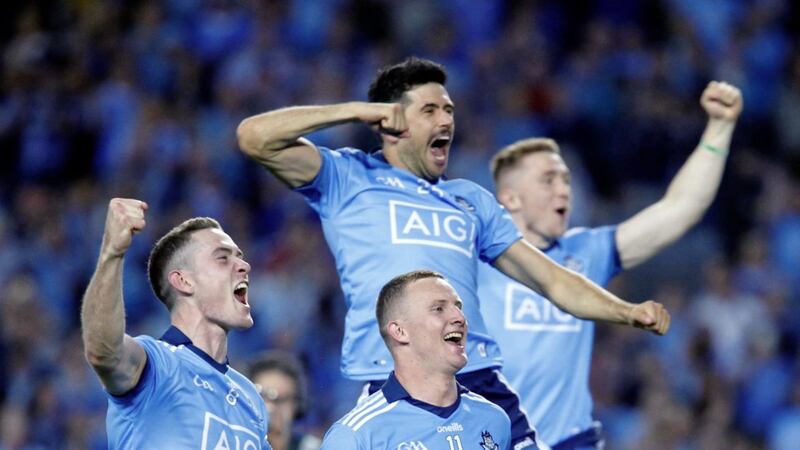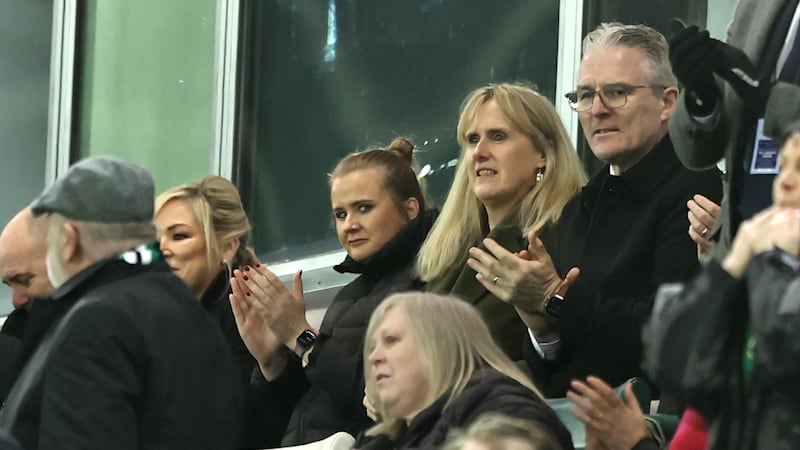LIKE a shoal of fish waving in unison as the light declines and the day blackens on top of them, the Hill danced its darlings into history.
There’s something different about these celebrations. The five-in-a-row chase brought even the Dubs out of the monotony. This was one they chased harder and seemed to celebrate sweeter.
The moments after the final whistle were met by displays of emotion and engagement so rare with this team that it couldn’t but seem like an end point.
Ciaran Kilkenny, Mr Process himself when it comes to interviews, guldered “we did it!” out across the stadium in his pitchside interview. The nursery closed in Croke Park around 7.30, just in time for the endless stream of kids to be handed over to Daddy for some on-field parenting.
Even Jim Gavin was very different. Usually so cagey, so reserved, so scripted, this time he seemed free. It was only in their unburdening that the burden of chasing history became truly apparent.
He waxed lyrical about Stephen Cluxton’s work the day after the drawn game, where he spent two hours out on the pitch, trying to get the replay of Killian Spillane’s goal in super slo-mo so he could see what his feet did wrong.
Gavin’s own future was left cloudy. He was never going to take the headlines away from his players by making a grand announcement, but even though what he said gave no real indication, it was the way he said it that left us questioning.
That was when he eventually came in to meet the tired and hungry press pack, having first slipped into the bar, conciliatory arm around the shoulder of Peter Keane.
When the Kerry manager came out five minutes later, he stood by the side of the team bus like a man in mourning. He may not have led them the whole way to Sam Maguire but he showed enough tactical innovation over the two games to suggest that they’ve the right man at the head of the bus.
The tunnel was as it always is after finals, a place where parallel universes meet. This sea of smiles comes crashing through into the wake next door. The Kerry men put on a brave face, and it was only in that snapshot of a disconsolate Keane that anyone really saw the depth of the devastation.
Bernard Brogan comes past the waiting hacks at such a brisk pace that no-one bothers trying to stop him to ask him the question we all probably know the answer to. Two Rockshore in his right hand, he’s bounding back between the bar and the changing room. There’ll be a SuperValu gig someday soon where he can draw an attentive crowd and say what he wants to say.
No sooner is one story written than there’s another waiting. The five-in-a-row is just complete but when the Dublin players emerge from the changing room almost two hours after the final whistle, they’re universally met by the same question, even if it has a layer of make-up to try and disguise it.
“Have you the hunger to go again next year?”
“Does it feel like the end of an era?”
“Will you be back yourself?”
Whatever thoughts of retirement exist were parked. This was neither time nor place. But perhaps as much as Jim Gavin’s demeanour was telling, so too was the absence of Stephen Cluxton by his side.
The All-Ireland winning captain has done his sole public speaking gigs when Sam Maguire is in his hands. And while he packed up his gloves on the final whistle as if he’d just won a league game with Parnells, there was a different cut about him too.
Joining the parade in front of the Hill, where he took a solo salute, suggested that he might just go out at the very, very, very top, having given two of his best ever displays for Dublin across the two All-Ireland finals.
Saturday evening billing didn’t give it much of an All-Ireland feel for the first 17 hours and 55 minutes of the day. But as the last note of Amhrán na bhFiann tailed off, the place suddenly caught fire.
And for the next 38 minutes, Dublin and Kerry produced entertainment to match the first day and quality to better it. 20 scores, every one of them from play. Kerry came from 0-5 to 0-1 down to level it at 0-10 apiece at half-time.
It feels like the Kingdom have their number, and then David Moran’s decision to punch rather than catch leaves him in a footrace with Eoin Murchan. Moran passes up two chances to foul, and he doesn’t get a third. From there, Dublin control it.
Kerry spring their hero of the first game, Tommy Walsh, but before he’s stepped on the field, Philly McMahon’s at him on the sideline. No team learns better than Dublin.
And so as the clock ticks to 70 minutes, the Hill knows. Five up, it spreads its collective arms as, lit up by the floodlights, Newfoundland comes into sight.
It took 130 years and more of searching but finally, fittingly, the blue brigade has led the GAA into a place it’s never been before.
Is it a place that it can come back from? It’s a paradox to think that in canning the most historic achievement in history, and even in kicking an astonishing 1-17 from play on Saturday, over the two games Dublin looked something closer to human and vulnerable than at probably any time in the five-in-a-row run.
Nothing lasts forever. Dublin will do well to stretch another year or two out of it before Kerry come and take it off them.
This felt like an end and a beginning, just not in the order that’s usually assigned to winners and runners-up.
And it’s only in this team breaking up and falling off their pedestal, for however brief a time, that the legacy of these Dublin players will actually be secured.
It’s only in seeing their expiration that we’ll appreciate that they’re human, and that what they’ve achieved is superhuman.







